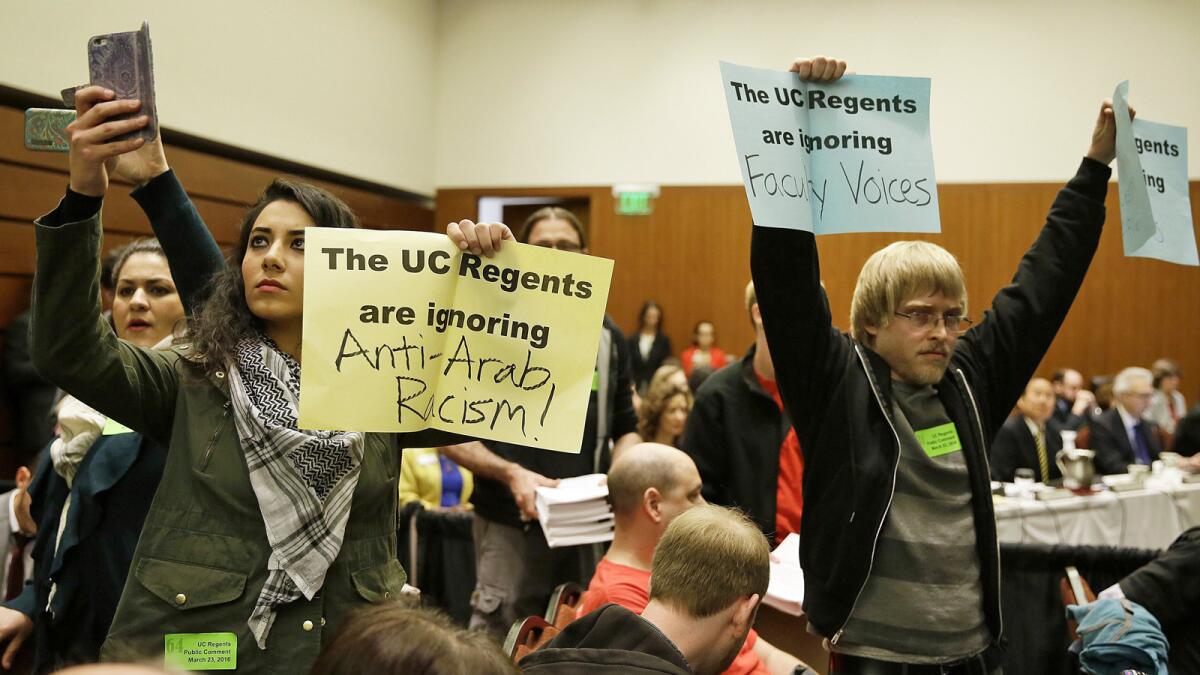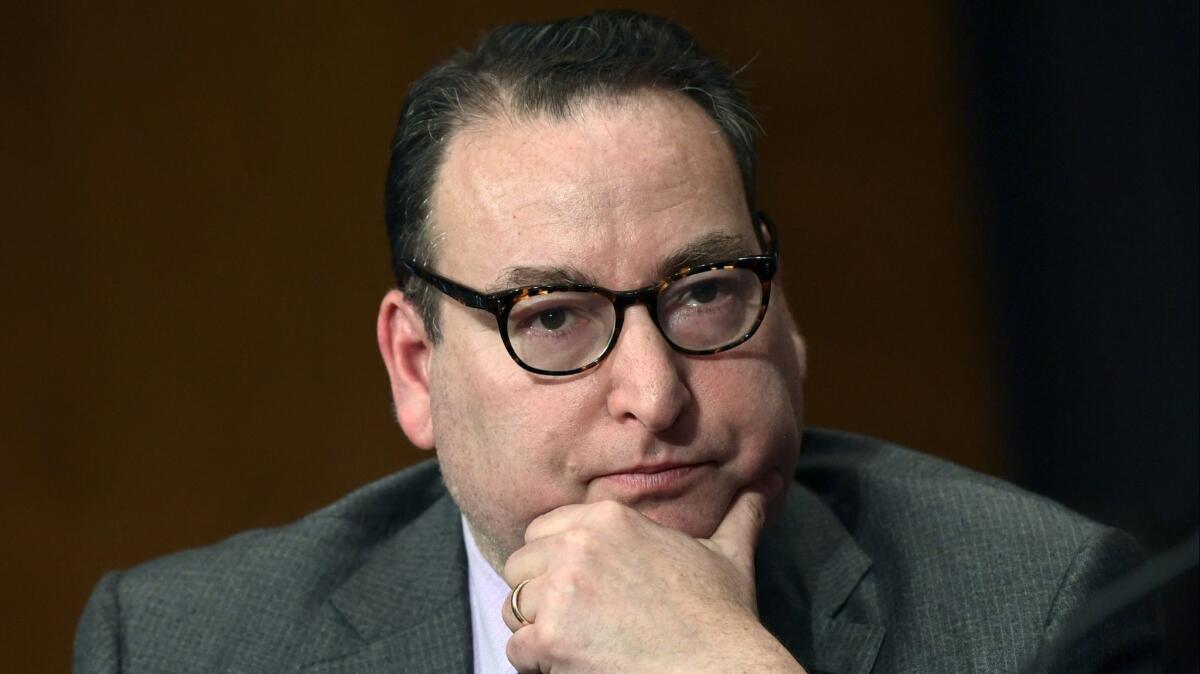Is speech critical of Israel anti-Semitic? In a case that could redefine campus politics, Trump administration weighs in

As protests against Israel and the U.S. government’s alliance with it have roiled college campuses across the country — with demonstrations in recent years shutting down speeches by pro-Israel speakers from the University of Minnesota to San Francisco State University — a few questions have repeatedly come up.
How much is Jewish identity tied to the modern nation of Israel? Is there a point at which criticism of Israel turns into hatred of Jewish people? If so, when is that line crossed? What is the difference between anti-Zionism and anti-Semitism?
Not surprisingly, pro-Palestinian activists and pro-Israeli ones often give contrasting answers to the questions.
In addition to conflicts between Israelis and Palestinians that have prevented peace in the Middle East, and a possible two-state solution, recent events have included the Trump administration’s move of the U.S. Embassy from Tel Aviv to Jerusalem, which Palestinians considered a major slight, and this week’s announcement by the State Department that it has ordered Palestinian leadership to close its office in Washington.
The Trump administration has now weighed in on the college issue, with the Department of Education’s civil rights office reopening a 2011 complaint against a New Jersey university about alleged bias against Jewish students.
In a recent letter to the Zionist Organization of America, a conservative group that has for years fought what it believes is widespread bias against Israel at colleges, the office said it would relaunch an investigation about Rutgers that closed four years ago under the Obama administration.
In the letter, the department said it would examine reports of discrimination on campus against Jewish people as an ethnic group and for the first time defined what it counts as anti-Semitism.
The letter listed Holocaust denial — a widely agreed upon sign of anti-Jewish beliefs — alongside common pro-Palestinian activist refrains, such as saying that “the existence of a state of Israel is a racist endeavor.” Calling Israel racist was listed under “denying the Jewish people the right to self-determination.” Another example of anti-Semitism, according to the letter, included “applying double standards by requiring of [Israel] a behavior not expected or demanded of any other democratic nation.”
The definition, taken from the State Department and the International Holocaust Remembrance Alliance, has alarmed student activists and pro-Palestinian groups that fear the Trump administration will launch more investigations on colleges for their students and professors’ pro-Palestinian activities that criticize Israeli policies. Under Title VI of the Civil Rights Act, the department can investigate colleges and universities that receive federal money for discrimination against race, color or national origin and revoke funding.
“This is an attack on the 1st Amendment,” said Samer Alhato, a Palestinian American student at St. Xavier University in Chicago and member of Students for Justice in Palestine, a organization behind protests criticizing Israel that has chapters on dozens of college campuses.
The group has supported the BDS movement — which pushes for boycotts, divestment and sanctions against companies deemed to have a role in Israeli human rights violations.
“It’s an attack on organizers and socially aware students. We’ve had many presidents who dogmatically and materially support Israel with rhetoric or policies,” Alhato said. “The Trump administration has taken it to another level.”
In an interview, the director and chief executive of the Anti-Defamation League took issue with the argument that the administration was curtailing free speech.
“There is nothing wrong with being critical of any country,” said Jonathan Greenblatt of the ADL, which is not part of the case. “But when there are campaigns that demonize and delegitimize the Jewish state, they often end up in actions that demonize and delegitimize Jewish people.”
Morton Klein, the president of the New York-based Zionist Organization of America, called the Department of Education’s move a “landmark decision that may bring some justice to the Jewish students who have been harassed and discriminated against at many universities.” His group filed the Rutgers complaint and has also filed others against Brooklyn College and and UC Irvine.
The Rutgers complaint stems from a free 2011 pro-Palestinian event where Jewish students were allegedly charged admission as a way to keep them out — an allegation disputed by the event’s organizers.
The Department of Education under President Obama said it found insufficient evidence to pursue the case. The Zionist group appealed in 2014 and, late last month, heard back from new leadership in the department that argued that previous lawyers who went over the case were wrong.

The letter was signed by Kenneth Marcus, the newly appointed assistant secretary for civil rights, who has long opposed pro-Palestinian activism. Marcus is the the former head of the of the Louis D. Brandeis Center for Human Rights Under Law, which its website says he founded in 2011 to “combat the resurgence of anti-Semitism in American higher education.” He held the same civil rights post in President George W. Bush’s administration for two years.
The Department of Education did not reply to phone and email requests seeking an interview about the case. Klein shared a copy of the letter with The Times.
In a statement, Rutgers officials said they were not notified of the new investigation but would cooperate. “There is no place for anti-Semitism or any form of religious intolerance at Rutgers,” the statement said.
The fight over what constitutes anti-Semitism has caused controversy across major universities, including the University of Chicago, University of Michigan, Columbia University and the University of California. Many incidents have included protests attempting to block pro-Israel speakers on campus, such as a 2016 San Francisco State University speech by Jerusalem Mayor Nir Barkat. Other controversies have centered on student governments passing calls for universities to divest endowments from certain companies that do business with the Israeli government. One targeted company is Caterpillar, whose bulldozers have been used to demolish Palestinian homes.
In 2016, UC regents unanimously declared that anti-Semitism has “no place” on a college campus but rejected intense lobbying to call anti-Zionism a form of discrimination. Instead, regents approved a report on intolerance that decried only “anti-Semitic forms” of the political ideology, leaving it up for interpretation which forms of anti-Zionism are anti-Semitic and which aren’t. The move reflected the regents’ struggle to balance their desire to combat intolerance with their commitment to protect free speech.
Some Israel supporters have organized to stamp out pro-Palestinian activities on campuses. Two years ago, casino tycoon Sheldon Adelson and others launched a multimillion-dollar effort to promote Israel on campuses and combat BDS. The effort kicked off at six California schools, including UCLA, UC Irvine and San Jose State. The Jewish Telegraphic Agency reported last month that it’s set to expand to 80 campuses in the U.S. and Canada.
A 2016 Pew Research Center poll found that 27% of millennials sympathize more with Palestinians, up from 9% in 2006 — while their generation’s support for Israel has declined in the same period from 51% to 43%. African Americans and Latinos are supporting the Palestinian rights movements, too, according to Pew. At the same time, the BDS movement has grown outside campuses, including in several historic Protestant church denominations that manage multimillion-dollar investment funds.
Despite the increased support for Palestinian rights movements, pro-Palestinian activists believe the Department of Education’s move will slow their groups’ growth.
“This can and will cause people to not speak out the way they want to, even on views that are becoming more common across the board,” said Rebecca Vilkomerson, the executive director of Jewish Voice for Peace, a left-wing group active on college campuses.
“I am especially concerned about Palestinian, Arab and Muslim students more broadly because it basically says people cannot talk about their own oppression and their own community’s oppression without being defined as anti-Semitic.”
More to Read
Sign up for Essential California
The most important California stories and recommendations in your inbox every morning.
You may occasionally receive promotional content from the Los Angeles Times.












